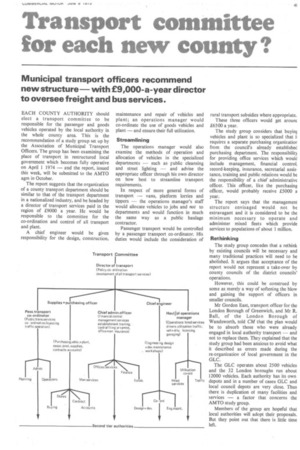Transport committee for each new cou ?
Page 51

If you've noticed an error in this article please click here to report it so we can fix it.
Municipal transport officers recommend new structure— with £9,000-a-year director to oversee freight and bus services.
EACH COUNTY AUTHORITY should elect a transport committee to be responsible for the passenger and goods vehicles operated by the local authority in the whole county area. This is the recommendation of a study group set up by the Association of Municipal Transport Officers. The group has been examining the place of transport in restructured local government which becomes fully operative on April 1 1974 — and the report, issued this week, will be submitted to the AMTO agm in October.
The report suggests that the organization of a county transport department should be similar to that of the transport department in a nationalized industry, and be headed by a director of transport services paid in the region of £9000 a year. He would be responsible to the committee for the co-ordination and control of all transport and plant.
A chief engineer would be given responsibility for the design, construction. maintenance and repair of vehicles and plant; an operations manager would co-ordinate the use of goods vehicles and plant — and ensure their full utilization.
Streamlining The operations manager would also examine the methods of operation and allocation of vehicles in the specialized departments — such as public cleansing and street lighting and advise the appropriate officer through his own director on how best to streamline transport requirements.
In respect of more general forms of transport — vans, platform lorries and tippers — the operations manager's staff would allocate vehicles to jobs and not to departments and would function in much the same way as a public haulage contractor.
Passenger transport would be controlled by a passenger transport co-ordinator. His duties would include the consideration of rural transport subsidies where appropriate. These three officers would get arounc /6500 a year.
The study group considers that buyhtE vehicles and plant is so specialized that ii requires a separate purchasing organization from the council's already established purchasing department. The responsibility for providing office services which would include management, financial control, record-keeping, insurance, secretarial assistance, training and public relations would be the responsibility of a chief administrative officer. This officer, like the purchasing officer, would probably receive £5000 a year.
The report says that the management structure envisaged would not be extravagant and it is considered to be the minimum necessary to operate and administer mixed fleets which provide services to populations of about 1 million.
Rethinking The study group concedes that a rethink by existing councils will be necessary and many traditional practices will need to be abolished. It argues that acceptance of the report would not represent a take-over by county councils of the district councils' operations.
However, this could be construed by some as merely a way of softening the blow and gaining the support of officers in smaller councils.
Mr Gordon East, transport officer for the London Borough of Greenwich, and Mr R. Ball, of the London Borough of Wandsworth, told CM that the plan would be to absorb those who were already engaged in local authority transport — and not to replace them. They explained that the study group had been anxious to avoid what it described as errors made during the re-organization of local government in the GLC.
The GLC operates about 2500 vehicles and the 32 London boroughs run about 12000 vehicles. Each authority has its own depots and in a number of cases GLC and local council depots are very close. Thus there is duplication of many facilities and services — a factor that concerns the AMTO study group.
Members of the group are hopeful that local authorities will adopt their proposals. But they point out that there is little time left.












































































































































